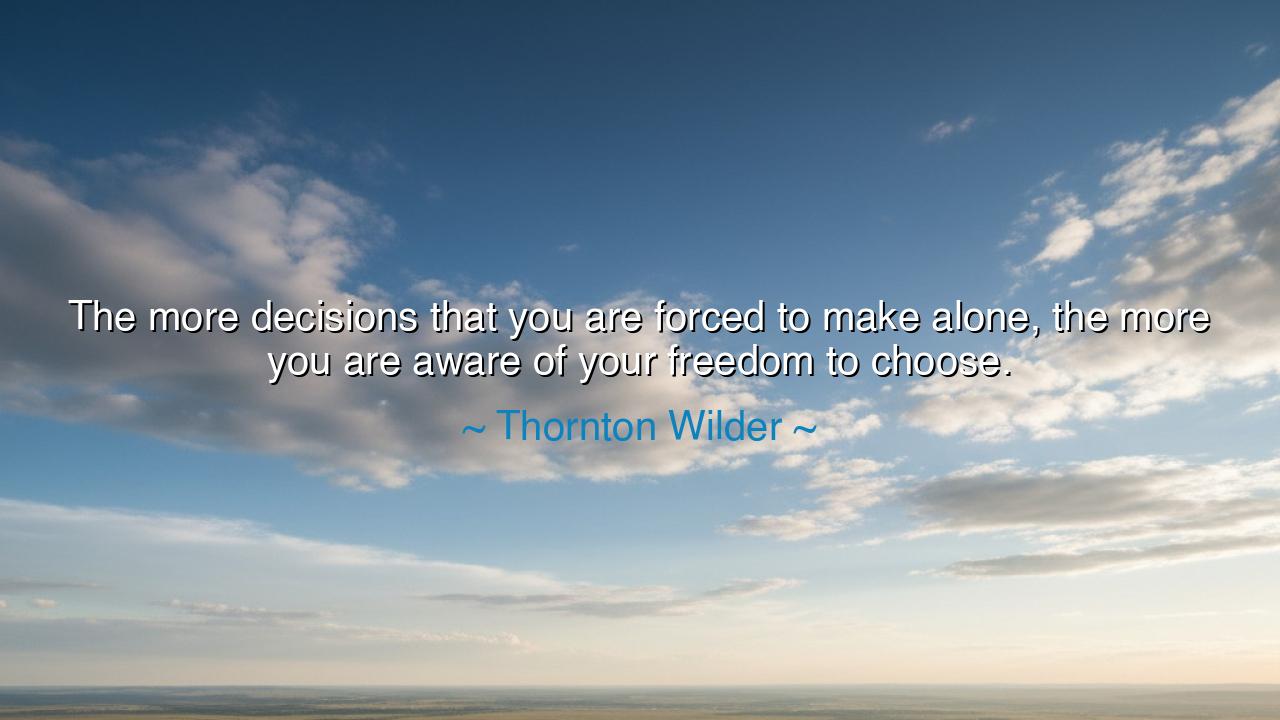
The more decisions that you are forced to make alone, the more
The more decisions that you are forced to make alone, the more you are aware of your freedom to choose.






"The more decisions that you are forced to make alone, the more you are aware of your freedom to choose." These words by Thornton Wilder evoke a profound truth about the nature of freedom and the human condition. Wilder, in his simple yet powerful reflection, points to the idea that true freedom is not simply the ability to make decisions in the presence of others, but the solitude in which we face our choices. It is in solitude, when we are forced to confront the weight of responsibility without the counsel or influence of others, that we truly understand the vastness of our freedom. This process of decision-making, where we stand alone, is both a burden and a blessing, for it opens our eyes to the boundless possibilities that life offers.
In the ancient world, the idea of solitude and individual choice was both revered and feared. The Stoics, such as Epictetus and Marcus Aurelius, believed that true freedom came not from external circumstances but from the ability to control one’s own mind and decisions. For the Stoics, freedom was the power to act in accordance with virtue and wisdom, even in the face of adversity. Epictetus taught that while we cannot always control what happens to us, we always have the power to choose how we respond. The decisions we make alone, in silence and contemplation, allow us to assert our freedom and act in ways that align with our deepest values, regardless of the pressures that society or others may impose on us.
The concept of personal choice and freedom is also central to Plato’s philosophy. In his works, especially in The Republic, Plato discusses the importance of the individual’s role in shaping their own life. Though he emphasized the importance of society and harmony, he also acknowledged that true fulfillment comes when an individual recognizes their freedom to choose wisely. The philosopher-king, who would rule the ideal state, was one who had mastered the art of making just and moral decisions, regardless of external influence. It was in solitude and self-examination that the philosopher found his highest calling, just as Wilder suggests that decisions made alone highlight the power and freedom inherent in the process of choosing.
Consider the story of Socrates himself, whose life was defined by personal choice and reflection. Socrates was often isolated in his pursuit of knowledge, questioning the status quo and the beliefs of those around him. In the trial that led to his death, Socrates was faced with a decision: to accept exile or to stand by his beliefs and face execution. His decision to stand alone, to face death rather than compromise his values, is a testament to the freedom that comes from the ability to make decisions independently, even when the world around you demands conformity. In his final moments, Socrates’ choice was a clear acknowledgment of the power of individual freedom—the freedom to choose truth over ease, integrity over fear, and wisdom over self-preservation.
The decisions we face alone, whether in moments of crisis, uncertainty, or introspection, provide us with the opportunity to connect deeply with our own values and principles. In the modern world, where external pressures to conform are often overwhelming, the freedom to choose remains one of the greatest gifts—and challenges—of our existence. Think of Nelson Mandela, who, though imprisoned for years, was forced to make profound decisions alone. Even in captivity, he did not relinquish his freedom of thought or his commitment to justice. His freedom to choose was not dependent on his circumstances but on his inner resolve and moral clarity. Like Socrates, Mandela’s decisions—made in the solitude of his cell—shaped not only his life but the future of his nation.
Wilder’s insight teaches us that it is through the solitude of decision-making that we truly embrace our freedom. In moments when we must make a choice without external influence, we are confronted with the depth of our own power. We are reminded that while others may guide us, our true path lies in self-determination. It is in those moments of aloneness, where the weight of the world presses down upon us, that we find the freedom to choose in alignment with our most authentic selves. These moments reveal our deepest values and define the course of our lives.
The lesson from Wilder’s words is one of empowerment and self-awareness. The next time you are faced with a difficult decision, do not fear the solitude in which it is made. Rather, see it as an opportunity to embrace your freedom. Take time to reflect on your inner values and desires. Know that in moments of solitude, you are not alone but standing with the full power of your choices. By trusting yourself and embracing the freedom to choose, you will find clarity, purpose, and the strength to walk your own path. Every decision you make in solitude is a step toward your truest self, a manifestation of the freedom that lies within.






AAdministratorAdministrator
Welcome, honored guests. Please leave a comment, we will respond soon